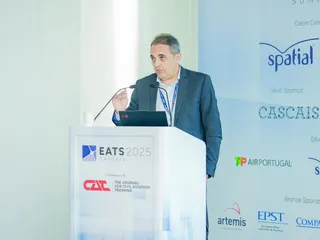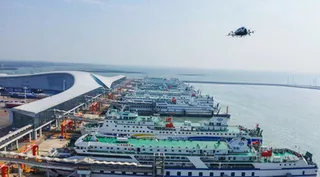EATS Panel Reveals FCS Revolution in Aviation
Contact Our Team
For more information about how Halldale can add value to your marketing and promotional campaigns or to discuss event exhibitor and sponsorship opportunities, contact our team to find out more
The Americas -
holly.foster@halldale.com
Rest of World -
jeremy@halldale.com

Key Takeaways
- FCS implementation timeline: The new regulation (RMT.0196) will be voted on in February 2026, with a two-year transition period before becoming mandatory
- Voluntary adoption: Training organizations can choose whether and when to adopt FCS—it's not mandatory unless they want to change their existing programs
- Capability-focused certification: FCS shifts from device categories (like Level D simulators) to what devices can actually do through 14 distinct features
- Training flexibility: The new system enables better alignment between training tools and specific competencies, moving beyond rigid device classifications
- Technology neutrality: FCS opens doors for innovative training technologies like VR while maintaining safety standards
A New Era for Aviation Training
At the European Aviation Training Summit (EATS) 2025 in Cascais, Portugal, industry leaders gathered to discuss one of the most significant regulatory changes in aviation training: the Flight Simulation Training Device (FSTD) Capability Signature (FCS). The panel brought together perspectives from EASA, major manufacturers Airbus and Boeing, and leading training organizations CAE and Lufthansa Aviation Training.
Captain Ascanio Russo, EASA's Aircrew Standards & Implementation Section Manager, set the stage by addressing concerns from the previous day's Head of Training event. "Many of the organizations are afraid of the changes," he acknowledged, "either because they are not informed well in advance, or because the changes bring something that they are not able to capture since the very beginning."
However, Russo delivered reassuring news: "For all the rest, this regulation does not introduce any change unless you want to change. The good thing about this new rule is that it is a path you may or may not decide to go for, and you have ample time to adjust."
Understanding the Problem: Why Change Was Needed
The current FSTD qualification system has created persistent challenges across the industry. Russo explained that regulators frequently receive complaints about simulators that do not meet expectations despite their certification level. "This FFS is a level D, but doesn't really represent these aircraft, or cannot be used for this type of training," he cited as a common complaint.
The fundamental issue? Today's FSTD qualification doesn't reflect the device's actual capabilities, fails to link to training needs, and doesn't allow for the introduction of new technology.
Captain Stéphan Labrucherie, Head of Flight Training Worldwide at Airbus, emphasized the broader implications: "If I compare the training we deliver today to the one I received in 95, that's only a small difference, totally, and we need to change this."
The FCS Solution: Capability-Based Qualification
The FCS system represents a fundamental shift in how simulators are certified and deployed. Rather than broad device categories, FCS evaluates 14 distinct features grouped into aircraft, human, and environmental capabilities, with four levels of fidelity: specific, representative, generic, and not applicable.
Russo highlighted the importance of the "not applicable" category: "Some of the manoeuvres that we have in the appendix nine for the type rating are not really linked with the type of aircraft we are flying. I'm just thinking, for example, the pilot incapacitation. You can train the pilot incapacitation in any device."
Johan Glantz, Head of Regulatory Affairs EMEA at CAE, clarified a common misconception: "In two years, we won't have a new FFS qualified as level D. It will be a 14s, and it will be specific for all 14 signatures." He emphasized that the engineering remains similar—"it's the way we label a sim change"—but with better descriptions of actual capabilities.
Industry Perspectives: Balancing Innovation and Safety
The panel explored how FCS enables more flexible, competency-based training while maintaining safety standards. Trent Smith, Senior Manager of Learning Design Team at Boeing Global Services, emphasized the importance of proper analysis: "It starts with the analysis, the focus on the objective. If it's meant to improve training effectiveness, it's probably a worthwhile effort. If it's purely for efficiency, that's something that we all have to look at."
Labrucherie raised a critical consideration often overlooked in discussions about new training technologies. "We are looking for a learning objective linked to a signature of a tool. But we never talk about the dark side of this tool," he warned. "When you use full VR, or if it's augmented VR, there are always some consequences in terms of training for the pilots. What we have to do is also to analyze what could be the negative impact of this tool."
Matthias Spohr, CEO of Lufthansa Aviation Training, articulated the training provider's perspective: "From the regulatory side, we need the openness to new technology to catch up with the speed at which technology evolves. From the manufacturer's side, there also needs to be commercially attractive solutions. It doesn't make sense if you have devices that are not commercially attractive if they are less qualified than the others."
Addressing Instructor Qualifications
A key concern addressed during the Q&A was whether instructors and examiners would be affected by FCS implementation. Russo provided clarity: "I would say no, but there is always a but." He explained that while FCS itself doesn't change instructor qualifications, new instructor regulations coming out simultaneously will restructure qualifications and privileges. However, "TRI SFI can still sit on the same seat and deliver training as it was in the past."
The Path Forward: One Word From Each Panelist
When asked for the single most important step the industry must take to leverage FCS, each panellist offered a succinct perspective:
Russo (EASA): "Flexibility—the flexibility that is introduced with the FCS will not only make the training more efficient, but most probably, we will have the right tool for the right task."
Glantz (CAE): "Embarking on using FCS is a journey. This new regulation is a bit more technology-agnostic for the training part than previous approaches, where we sometimes looked at what device I have and what I can do with it."
Spohr (Lufthansa): "It's about efficient training. We can make sure that training in 10 years looks different from what it has been the last 20 years."
Smith (Boeing): "Due diligence in the analysis. The unintended consequence of efficiency, if you lose the effectiveness, could be of significant consequence."
Labrucherie (Airbus): "We have to be very open-minded, cautious, and humble in the approach. We have to train pilots. With the flexibility this will bring, we can train maybe in a smarter way to be safer, because at the end, training is for safety."
A Smarter Future
The FCS framework represents more than a regulatory update—it's a fundamental reimagining of how the aviation industry certifies and deploys training devices. By focusing on capabilities rather than categories, FCS creates pathways for innovation while maintaining the industry's unwavering commitment to safety.
As the industry moves toward the February 2026 vote and subsequent two-year transition period, one message resonated clearly from the EATS panel: flexibility, thoughtful analysis, and openness to technology—balanced with awareness of potential pitfalls—will be essential to creating more effective, safer pilot training for the next generation.
The revolution in aviation training isn't just coming—it's already being designed, debated, and prepared for implementation by the very leaders who gathered in Cascais to chart its course.
Interested in how emerging technologies like AR/VR and AI will integrate with competency-based training frameworks? Join us at WATS 2026 in Orlando, Florida, May 5-7, where industry leaders will explore the practical implementation of these innovations.
Save your Seat for WATS 2026!

